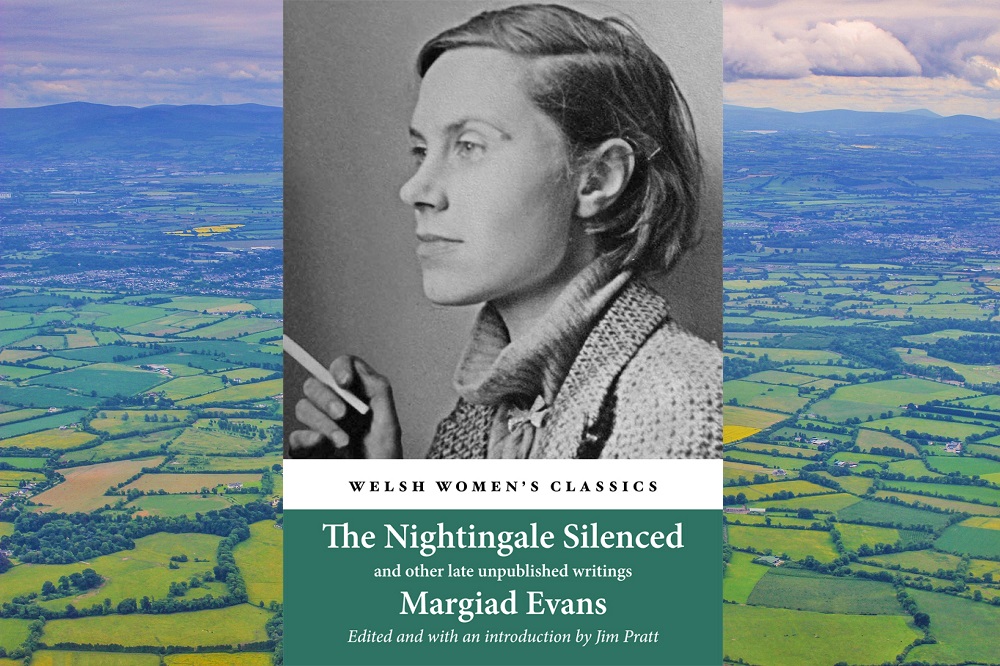Review: The Nightingale Silenced gives Margiad Evans a voice once more

Jon Gower
The cover photograph of this collection of late writing by the finest novelist of the Welsh borderlands shows Evans staring resolutely ahead of her, a fixedness underlined by the clear-lined set of her jaw and the angled jut of a cigarette held between her fingers.
It’s the gaze of a writer who described what she did as ‘not thinking but seeing writing… With a disbelief in in my own powers of being and feeling, I see the things before me, and a stranger, thoughtless calm falls on me wherever I am.’ It’s also the face of a woman who saw herself as ‘very strong. Like a steel rope’ whose strength was tested to the limits be years of severe epilepsy.
Margiad Evans, whose real name was Peggy Whistler, wrote four novels, two poetry collections, two volumes of autobiographical prose and a collection of short stories but there was also a huge mass of unpublished material. This new volume presents just some of it, being a journal of a trip around Ireland and an account of her struggle to come to terms with her illness and, as her nephew, Jim Pratt, the editor of this volume puts it ‘to write her way around it but not to submit to it.’
There are also letters to her benefactor which also illuminate the illness as her life draws to a premature end because of an inoperable brain tumour.
It was that benefactor, Bryher (Annie Winifred Ellerman) who paid for the trip Evans took around Ireland with her husband and it amply demonstrates her facility for language and briskly capturing a scene. As you’d expect she saw many priests, in ‘surgeons’ black hombergs’ as well as a plenitude of travelling nuns who are ‘mounds of rocking black petticoats & veils with an umbrella ferrule sticking out of the bottom for a third leg. One wears under her black cloak & hooded veil, a thick ivory serge robe that would for a Dior dinner dress.’
She pretty much paints what she sees as she goes, noting the almost ‘sour, sharp colour’ of the light green hay fields and the way the cattle ‘lay in the reeds in the boggy fields and single low clouds were stabling themselves in their stalls of rock.’ They show, as she suggests ‘the almost absurd hunger of a certain kind of epileptic mind for beauty. And not only beauty but the suddenness of beauty.’
Hate
Margiad Evans was one of the first people who write about epilepsy from the inside and this helped sufferers and scientists alike to understand the condition. In her case, it manifested itself about the time she was pregnant and led to periods of hospitalisation and self-examination and even if she ‘learned nothing new in the light of my recent active epilepsy if it is not a sense of the magnificence of common things.’
This lesson was one learned without little cost as her descriptions of some of the incidents during her illness underline its severity. She fears that she might kill her own child during a fit and keeps to a room away from her. She becomes obsessed by doors, wanting them shut and open at the same time and thinking that she can be both sides of the same one. And the fits keep coming, sometimes at a punishing rate, one after the other. She gets to hate life.
And as her letters attest this led to her thinking that the writing was over, even though she somehow summoned up the strength to write about the treatment of the tumour that would eventually kill her.
Silence
This volume adds to our sense of both the complexity and ability of Margiad Evans’ writing, even as it tantalizes with the idea of there being much more rich material in the unpublished archives. Hopefully it will also send people to the work itself, brutally brilliant accounts of rural life on the cusp of Wales and England.
In the Journal in Ireland there is evidence to show that, given the right breaks, she might well have become a travel writer. Her novels prove that like her fellow epileptic Fyodor Dostoyevsky she could turn suffering into art.
The title of this present book derives from an incident in 1951 when she heard a nightingale, that finest of songbirds singing outside her garden flat in Cheltenham, only to be scared away. The memory of that sudden silencing of the bird haunted her ever since… ’as the absolute symbol of all the joy in existence, the seizures and the treatment have done to me.’
With the appearance of these late unpublished works, including a handful of poems, Margiad Evans is once again given voice, showing her defiant spirit to be ultimately unsilenceable.
Support our Nation today
For the price of a cup of coffee a month you can help us create an independent, not-for-profit, national news service for the people of Wales, by the people of Wales.






